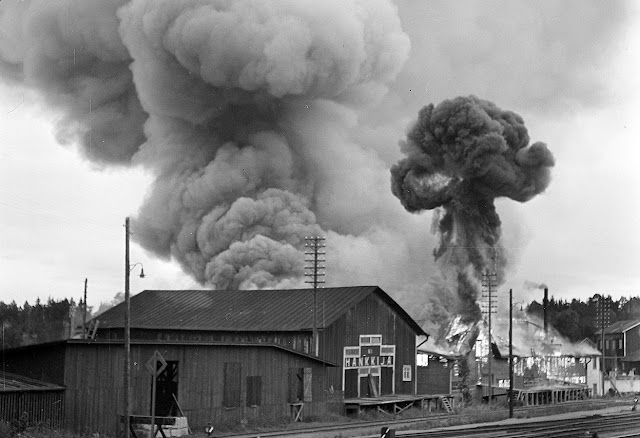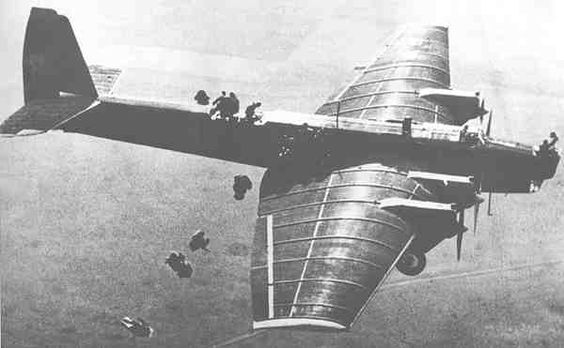Tuesday 16 January 1940
Winter War Air Operations: In extremely frosty weather, the Soviets launch more raids on southern Finland. Since 12 January, the Soviets have dropped almost 3,000 bombs on 50 cities. That is tiny by later standards, but Finland is a small country.
French Government: Premier Daladier has been extremely critical of the communist subversion of the war effort. Today, 66 communist deputies are ejected from the Chamber of Deputies.
Mechelen Incident: At 19:00, Hitler finally decides that Jodl is right and the weather is too poor for an invasion. He postpones Fall Gelb indefinitely. Part of his reasoning may be the frantic defense preparations of the Low Countries and France in recent days - Hitler is renowned for reading foreign newspapers every day.
Battle of the Atlantic: The Admiralty finally announces the loss of the HMS Seahorse, HMS Undine and HMS Starfish on 7-9 January. The Germans then chime in that they have rescued parts of the crew from two of the British boats.
U-44 (Kapitänleutnant Ludwig Mathes) continues its string of victories from the 15th. At 06:11, it torpedoes and sinks the 4,661 ton Greek freighter Panachrandros west of Brest. All 31 onboard perish.
British 9,456 ton tanker Inverdargle hits a mine laid by U-33 two months previously in Bristol Channel. All 49 onboard perish in the frigid winter weather some 30 miles from their destination.
British freighter Gracia is traveling in convoy OB-72 when it hits a mine laid by U-30 on 6 January 1940. The ship is damaged but remains afloat for now.
German blockade runner Albert Janus is intercepted by French armed merchant cruiser Victor Schoelcher. The crew scuttles it.
Convoy OA 73 GF departs from Southend, OB 72 departs from Liverpool, OB 73 departs from Liverpool, SL 17 departs from Freetown, and HG 15 departs from Gibraltar.
British Military: General Wavell embarks on an inspection tour of Palestine and Iraq.
China: The Chinese 4th War Area recaptures Yinchanao north of Canton.
Holocaust: The Polish Government-in-exile prepares a report on German atrocities in Poland. The Germans have shot 5000 people in Poznan alone, and thousands more are being housed in concentration camps. Poland has become a true police state, with mass arrests of suspect individuals such as college professors. Particularly hard hit are Jews and Gypsies.
 |
| The aftermath of a Soviet bombing attack on Finland. |
January 1940
January 1, 1940: Finns Carve up the SovietsJanuary 2, 1940: Finnish Counterattacks Continue
January 3, 1940: Soviets Trapped
January 4, 1940: Soviet Breakout Attempts Fail
January 5, 1940: Dicing Up the Soviets
January 6, 1940: Soviet 44th Division Runs
January 7, 1940: Shakeup in Soviet High Command
January 8, 1940: Ratte Road Battle Ends
January 9, 1940: British Submarines in Peril
January 10, 1940: Mechelen Incident
January 11, 1940: Finns Surround More Soviets
January 12, 1940: New Soviet Attacks at Taipale
January 13, 1940: Fall Gelb Postponed
January 14, 1940: Japan's Government Falls
January 15, 1940: Soviets Prepare More Carefully
January 16, 1940: German Atrocities Uncovered
January 17, 1940: Bletchley Park in Action
January 18, 1940: New Hope for Allied Shipping
January 19, 1940: Finnish Attacks at Salla
January 20, 1940: Churchill Urges Cooperation
January 21, 1940: Asam Maru Incident
January 22, 1940: Dissension Within British Government
January 23, 1940: Dissension in South Africa
January 24, 1940: NKVD Blocking Detachments
January 25, 1940: Auschwitz Site Selected
January 26, 1940: Millionaire Bunker Destroyed
January 27, 1940: U-20 Sinks Four Ships
January 28, 1940: Softening Up the Finns
January 29, 1940: Moscow Willing to Talk
January 30, 1940: Hitler Throws Down the Gauntlet
January 31, 1940: Timoshenko Is Ready
2019

No comments:
Post a Comment